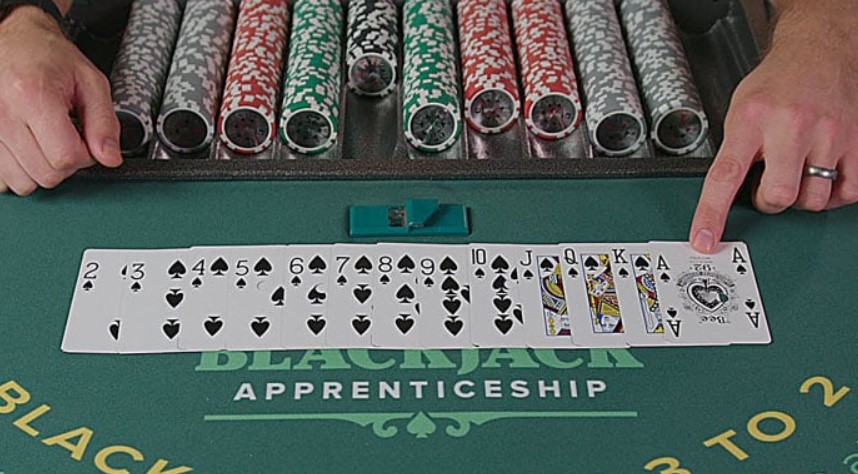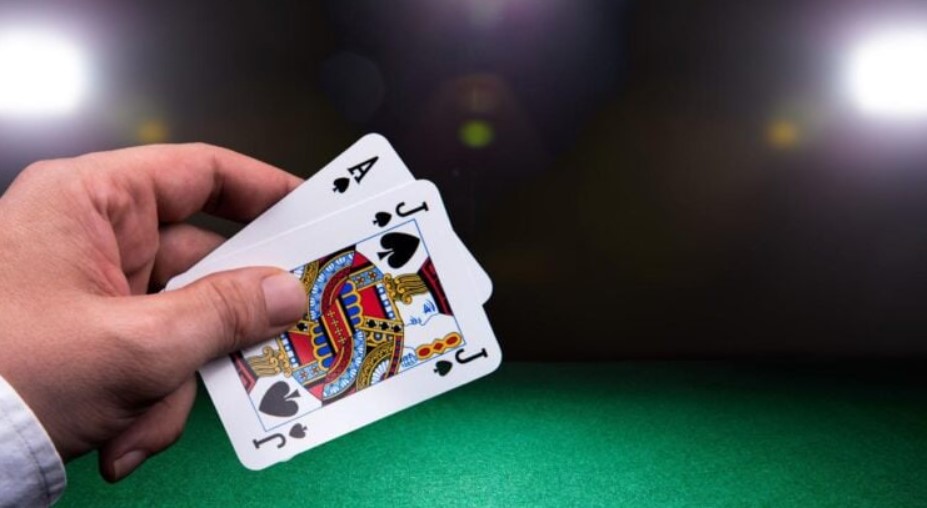Blackjack is one of the most popular and iconic casino games worldwide, enjoyed by both seasoned gamblers and casual players alike. Known for its relatively simple rules and potential for strategic play, this 21 card game has captivated generations of players. Whether you’re a newcomer looking to get started or an experienced player aiming to sharpen your skills, understanding the intricacies of the game is key to success. This blackjack guide will provide a comprehensive breakdown of the game, its rules, and tips on how to win blackjack. From learning the basics to mastering the strategies, you’ll have all the information you need to enjoy online blackjack or in-person blackjack games.

Game Overview
Blackjack, often referred to as “21 card game,” is a card game where the objective is to beat the dealer by getting a hand value as close to 21 as possible without going over. It’s a game that combines elements of luck and skill, offering players the chance to improve their odds by making informed decisions. Unlike many other casino games that rely purely on chance, 21 gives players the ability to influence the outcome based on the actions they take. The game is usually played at a black jack table with multiple players competing against the dealer.
Traditionally, 21 is played with one or more standard decks of 52 cards. However, variations of the game, particularly online blackjack, often use multiple decks to increase the challenge and minimize the effects of card counting. One of the most compelling aspects of 21 games is that players are not competing against each other; rather, each individual competes solely against the dealer.
Basic Elements of the Game
Before diving into the rules of 21, it’s important to understand the basic elements that make up the game.
- The Deck(s): Most 21 games use standard 52-card decks, but the number of decks in play can vary. Single-deck games are becoming rarer, with most casinos and online blackjack platforms opting for six or eight-deck games to increase the difficulty.
- The Table: A black jack table is typically semi-circular in shape, allowing for up to seven players. Each seat has its own betting area in front of it, where players place their wagers. The dealer stands opposite the players and manages the game, dealing the cards and enforcing the blackjack dealer rules.
- The Chips: Players use casino chips to place bets. Bets are made before any cards are dealt, and players can only bet within the table’s minimum and maximum limits.
- The Dealer: The dealer’s role is to manage the game, distribute the cards, and follow strict rules for how they must play their hand. Understanding the blackjack dealer rules is crucial, as they govern how the dealer reacts to each situation.
Blackjack Rules
The rules of blackjack are straightforward but can vary slightly depending on where and how you play. Whether you’re at a physical black jack table or playing online 21, the core rules remain the same. Here’s a breakdown of the most important blackjack rules.
How Are the Cards Dealt?
At the start of the game, each player places their bet in the designated betting area. The dealer then deals two cards to each player and two cards to themselves. Typically, the dealer’s cards include one face-up card (known as the “upcard”) and one face-down card (known as the “hole card”). The cards are dealt clockwise, beginning with the player to the dealer’s left. Understanding black jack rules is the first step toward becoming a more skilled player at the table.
Players’ cards are generally dealt face-up, especially in casinos and online 21 games. This doesn’t put the player at a disadvantage because the dealer must follow strict blackjack dealer rules when playing their own hand.
Basic Player Actions
Once the initial cards are dealt, players must decide how to play their hand. The main actions a player can take are:
- Hit: Take another card from the dealer. Players may continue to hit until they decide to stand or their hand value exceeds 21, resulting in a “bust.”
- Stand: Keep their current hand and end their turn. One of the key elements of success is mastering the blackjack card values and knowing how to adjust your strategy accordingly.
- Double Down: After receiving their initial two cards, players can double their initial bet in exchange for one additional card. After doubling down, the player must stand.
- Split: If a player’s initial two cards have the same value, they can choose to split them into two separate hands. The player must place an additional bet equal to their original wager to play both hands independently. Many seasoned players will tell you that one of the most important tips on how to win at blackjack is to avoid emotional decisions and stick to a clear strategy.
- Surrender: Some 21 games offer the option to surrender, allowing players to forfeit half their bet and end their hand early.
- Insurance: If the dealer’s upcard is an Ace, players may choose to take “insurance” against the dealer having a 21. The player places a side bet equal to half their original wager. If the dealer does have 21, the insurance bet pays out at 2:1. However, many experienced players avoid this option, as understanding what is insurance in 21 is essential to recognizing it as a generally poor bet statistically. Familiarizing yourself with the rules of blackjack will help you make better decisions during gameplay.

Card Value and Scoring
The value of each card in blackjack is essential to determining your strategy. Here’s how the blackjack card values break down:
- Number Cards (2-10): These cards are worth their face value.
- Face Cards (Jacks, Queens, Kings): All face cards are worth 10 points.
- Aces: Aces can be worth either 1 or 11 points, depending on which value benefits the player more. For example, if you have a hand with an Ace and a 7, the Ace would be worth 11, giving you a “soft” 18. If you draw a card that causes your total to exceed 21, the Ace would revert to a value of 1.
A 21 is an Ace and a 10-value card (either a 10, Jack, Queen, or King) dealt as the initial two cards. This is the best possible hand, and unless the dealer also has a 21, it results in an immediate win for the player.
Additional Rules and Game Options
While the core rules of blackjack remain consistent, there are several additional rules and variations that can alter the gameplay. These variations are commonly found in both land-based casinos and online 21 platforms.
Rules for Multiple Decks
The use of multiple decks is a common variation in blackjack games, particularly in casinos. When multiple decks are used, the game can be more challenging because it becomes more difficult to track which cards have been dealt. Some of the key variations include:
- Single Deck: Only one deck is used, making it easier for players to track cards, which can influence their decisions. If you’re looking for tips on how to win blackjack, mastering basic strategy is a great place to start.
- Double Deck: Two decks are used, increasing the difficulty but still providing opportunities for card counting.
- Six or Eight Decks: Most casinos and online blackjack games use six or eight decks to minimize the effectiveness of card counting and increase the house edge.
Other Variations and Side Bets
Many blackjack games offer additional side bets or variations to the standard gameplay. These can include options like:
- Perfect Pairs: A side bet on whether your first two cards will form a pair.
- 21+3: A side bet combining your first two cards and the dealer’s upcard to form poker-style hands like straights or flushes.
These side bets can add an extra layer of excitement to the game, but they generally come with higher house edges, making them riskier than standard 21 strategies. If you’re wondering how to win at blackjack, start by studying basic strategy and managing your bankroll effectively.
Tips and Tricks for Beginners
Blackjack can be an intimidating game for newcomers, especially when playing at a busy black jack table. However, by following a few simple tips, beginners can improve their chances of winning and gain confidence at the table.
- Learn Basic Strategy: Before jumping into real money blackjack games, take the time to study basic strategy. This is a mathematically proven set of rules that tells you the best action to take in every possible hand situation. It’s the cornerstone of any blackjack guide and helps reduce the house edge to its lowest possible level.
- Start with Low Stakes: If you’re new to the game, it’s wise to start with low-stakes tables, whether in a casino or playing online 21 This allows you to practice and gain experience without risking large amounts of money.
- Avoid Insurance: As tempting as it might be, taking insurance is generally a bad bet. The odds of the dealer having 21 are not favorable enough to make this a profitable play in the long run. Understanding what is insurance in blackjack and why it’s best avoided is crucial for new players.
- Manage Your Bankroll: Set a budget for your 21 sessions and stick to it. This will help you avoid the temptation to chase losses and will keep your gaming experience enjoyable rather than stressful.
- Practice Online: Online 21 is a great way to practice and hone your skills. Many online casinos offer free blackjack games where you can play without risking real money. This is a fantastic opportunity to learn the blackjack rules, practice strategies, and get comfortable with the flow of the game.
- Stay Focused: Blackjack is a fast-paced game, and it’s important to stay focused, especially when it’s your turn to act. Avoid distractions and make sure to think through each move carefully. For those asking how to win blackjack, it’s crucial to know when to hit, stand, double down, or surrender based on the dealer’s upcard.
- Know When to Walk Away: One of the most important lessons for any gambler is knowing when to quit. Set both winning and losing limits for yourself, and stick to them. This will help you walk away with your winnings intact or prevent you from losing more than you can afford. Learning how to win blackjack consistently requires practice, patience, and the ability to adapt to different situations.
Conclusion
Blackjack is a thrilling card game that offers a unique blend of luck and strategy. Whether you’re playing at a physical black jack table or enjoying online blackjack from the comfort of your home, understanding the basic rules of 21 , learning about card values, and practicing good strategy can dramatically improve your chances of success. This blackjack guide has covered everything from the fundamentals of how to win at blackjack to more advanced tips for staying ahead in the game. With patience, practice, and a solid grasp of the blackjack rules, you’ll be well on your way to mastering this timeless casino classic.
